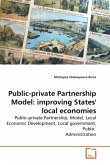Government is viewed as the primary actor in the social sector both in developed and developing nations. However, it is found that in some sectors performance of private sectors are much more efficient than government. It is assumed that partnership can produce cost-effective and efficient citizen services. International pressure groups and institutions make the concept of decentralization a popular one and introduce a new mode of governance. So, gradually partnership in various forms has started. Due to the inefficiency of public sector in developing countries, private sector initiatives have emerged with strong potentials along with the government sector now-a-days. This study tries to explore success of Public Private Partnership (PPP) as well as identifying core issues that could hinder forming efficient partnership. It is expected that the findings should provide some new insights on forming a sustainable PPP and should be especially useful to academicians, researchers and professionals working in social sector as well as to the business community.
Bitte wählen Sie Ihr Anliegen aus.
Rechnungen
Retourenschein anfordern
Bestellstatus
Storno








